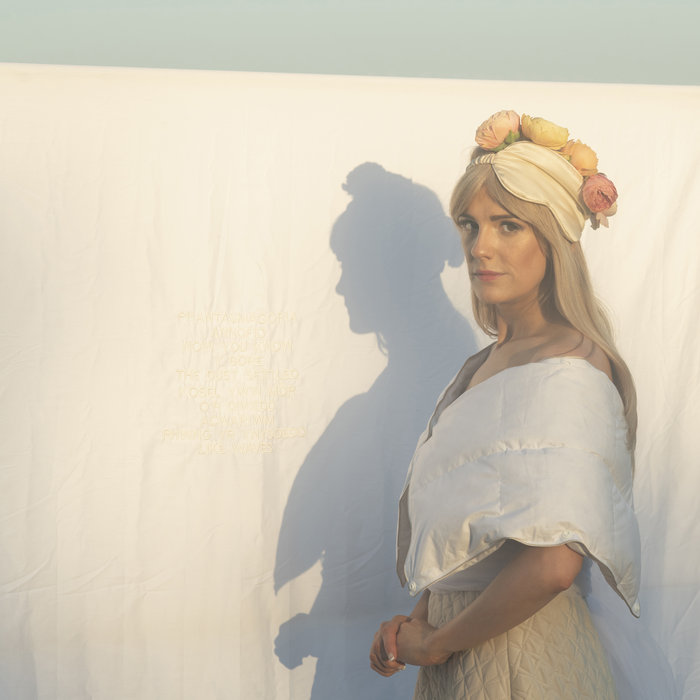Phantasmagoria: A bizarre or fantastic combination; a constantly shifting, complex succession of things seen or imagined. These definitions wholly encapsulate the circumstances that shaped the narrative structure and exquisite tonal palette coursing through Ani Glass’s thrilling second LP. Its long-awaited arrival ends a five-year gap since the Welsh-Cornish artist released her critically acclaimed solo debut, Mirores, a momentous milestone in her career that was unfortunately usurped by a benign brain tumour diagnosis. Glass’s latest material, on which her production style demonstrates great growth, is a sumptuous synth-pop meditation on processing that traumatic period whilst untangling the experiences and emotions that steered her to this moment.
Much like her sister, and former Pipettes bandmate, Gwenno, Ani Glass has asserted herself as a more than compelling and noteworthy architect of terrifically dynamic arrangements of organic and electronic instrumentation, a texturally rich backdrop to offset her beautifully crystalline cadence. Opening with the heavenly ascension of Glass’s vocals on the title track, one that feels indebted to the more contained moments in that ever-enduring masterclass in techno-pop, Ray of Light, she presents us with an irresistible invitation to spend time in Phantasmagoria’s lush surrounds. The song progresses under the guidance of a steady drum machine while an ethereal cloak of mellotron flute motifs and rich vocal layering persists until the denser dance-led space is unexpectedly replaced by a sweet new age climax. It’s one of many moments where Glass demonstrates her astute production sensibility, particularly when it comes to marrying contrasting sonic realms in a short space of time.
Citing Giorgio Moroder and Vangelis as reference points for Phantasmagoria, as well as Arthur Russell for inspiring Glass to pick-up the cello, which subtly summons some of the LP’s finest turns on ‘Y Bore’ and ‘The Dust Settled’, Glass utlises those influences as stabilising foundations for her to experiment with form and showcase the chameleonic quality of her vocals. A standout moment where she demonstrates her propensity for complexity in structure and style is the dreamlike ‘Kosel Yw’n Mor’ on which she conjures a blend of Elizabeth Fraser, Julee Cruise and Marianne Faithfull as the synths eloquently wrap around her, as if to protect her from the hammer-like beat that splices through the track before unlocking a shock of compact drum machines pulsing into the final seconds.
Phantasmagoria deftly takes the electronic framework established in Mirores, her introduction to self-producing her music, and broadens the parameters for Glass to play within. While the album’s brighter moments, such as the infectious retro-futuristic synth-pop of ‘Arnofio’, the sugary ‘O’r Diweed’ or the slinky disco groove of ‘Y Bore’, are immediate standout moments, it’s the folk-horror atmosphere conjured in the closing track, ‘Like Waves’, which finds Glass’s artistry at the height of its powers. A foreboding organ takes us into a nocturnal space as she glacially intones, “I only see what I want / The stars are shining in his eyes tonight / And they’re going to tell me that it’s going to be alright”. The eeriness permeating the minimal arrangement, cuts through its reassuring refrain, once again highlighting the dichotomy that exists in the optimistically inclined arrangements underpinned by lyrics that reflect the variety of emotions (good and bad) that inform the character persisting throughout the album.
Singing between Welsh, Cornish, and English, lends an air of mystery (or perhaps attempts to retain some privacy) to Glass’s reflections of the challenging period that preceded this LP. That, however, doesn’t translate into Glass being an evasive protagonist. If anything, it’s her vulnerability and resilience, best captured in the industrial electronic-landscape of ‘Now You Know’, that ground Phantasmagoria’s otherworldly essence. As a work grounded by personal upheaval and the inconceivable task of building yourself back-up, Ani Glass graciously demonstrates how this can be done one glorious beat at a time.


